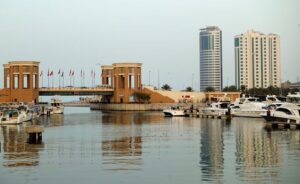Starting a company in Bahrain involves choosing the right legal structure, reserving a trade name, registering online through the government’s Sijilat portal, drafting company documents, securing approvals and licenses, and then opening a corporate bank account.
Once incorporated, you’ll need to comply with VAT, labour, and renewal requirements.
This article explains why Bahrain is an attractive destination for business, the step-by-step process of registration, costs and timelines, required documents, and post-incorporation compliance, followed by frequently asked questions.
My contact details are hello@adamfayed.com and WhatsApp +44-7393-450-837 if you have any questions.
The information in this article is for general guidance only. It does not constitute financial, legal, or tax advice, and is not a recommendation or solicitation to invest. Some facts may have changed since the time of writing.

Why Start a Business in Bahrain?
Bahrain has positioned itself as one of the most open economies in the Gulf. Unlike many of its neighbours, the country allows full foreign ownership in most sectors, making it easier for entrepreneurs and investors to establish a presence without needing a local partner.
The government has also created a clear and efficient framework for incorporation. The Sijilat system, an online commercial registration portal, allows business owners to complete most steps digitally from reserving a trade name to applying for a commercial registration certificate.
This reduces bureaucracy and speeds up the process compared to traditional paper-based systems.
Bahrain’s appeal goes beyond administrative ease. Its central location in the Gulf makes it a natural hub for trade, logistics, and financial services, with direct access to Saudi Arabia and strong connectivity across the Middle East.
The country has actively promoted itself as a regional financial center, home to banks, fintech firms, and investment companies, while also fostering growth in sectors like technology, manufacturing, and tourism.
Most business activities allow full foreign ownership, though some regulated sectors may require local participation.
The business environment is further strengthened by competitive costs. Office space, labour, and operating expenses are generally lower than in Dubai or Doha, while Bahrain still benefits from a multilingual workforce and modern infrastructure.
On the fiscal side, most companies are exempt from corporate income tax, with taxation limited to oil and gas activities. The only major levy is a 10% value-added tax (VAT), which applies once a company crosses the turnover threshold.
For entrepreneurs, these factors combine to create a pro-business setting: low barriers to entry, cost competitiveness, and access to regional and global markets.
How to Open a Company in Bahrain
While exact requirements vary by sector, the general process for setting up a company in Bahrain involves the following steps:
- Define the business activity and structure
Decide on the type of entity (WLL, BSC, branch, etc.) and the activity your business will engage in. Some sectors, such as finance, healthcare, or telecom, require additional regulatory approvals. - Reserve a trade name
Apply for a trade name through the Sijilat portal, managed by the Ministry of Industry and Commerce (MOIC). The name must be unique and compliant with local naming regulations. - Secure a registered office address
Every company must have a local office address. This can be a physical space or, in some cases, a serviced office arrangement. A signed lease agreement is required for registration. - Obtain security clearance
Shareholders and directors, especially foreign nationals, must undergo a background check and obtain security approval before the company can be registered. - Prepare company documents
Draft and notarize the Memorandum and Articles of Association, as well as any powers of attorney if shareholders are represented by third parties. For foreign shareholders, documents often need legalization and translation. - Submit application for Commercial Registration (CR)
File the application through the Sijilat portal, including all supporting documents. The CR is the core license that authorizes a company to operate in Bahrain. - Apply for special licenses if required
Businesses in regulated sectors need additional approvals from relevant authorities (e.g., Central Bank of Bahrain for financial services, Ministry of Health for medical services). - Open a corporate bank account
Once the CR is issued, a company can open a corporate account with a local bank. Banks will request incorporation documents, details of shareholders and directors, and proof of source of funds. - Register for VAT and labour requirements
Companies crossing the annual turnover threshold must register for VAT. If hiring employees, registration with the Labour Market Regulatory Authority (LMRA) is required for work permits and visas.
Completing these steps usually takes between one and three weeks for straightforward cases, though more complex businesses can expect longer timelines.
Company Formation in Bahrain
The first decision when setting up in Bahrain is choosing the legal form of your company. The right structure depends on your business activity, the scale of operations, and your long-term goals.
- With Limited Liability Company (WLL/LLC)
This is the most common option for small and medium-sized businesses. It requires at least two shareholders, though in many cases it can be owned entirely by foreign investors. Liability is limited to the capital contributed, which protects the personal assets of shareholders. - Closed Shareholding Company (BSC – Closed)
Suitable for larger businesses that want to bring in multiple investors but not list shares publicly. Minimum capital requirements are higher than for a WLL, and it allows more complex ownership structures. - Public Shareholding Company (BSC – Public)
Designed for major enterprises, this structure allows shares to be offered to the public and traded on the Bahrain Bourse. It is subject to stricter regulatory oversight and corporate governance standards. - Branch of a Foreign Company
This option allows an established overseas company to set up a branch in Bahrain without incorporating a new entity. It is fully dependent on the parent company and must operate within the scope of the parent’s business. - Other Structures
Partnerships and professional firms exist for niche cases, particularly in consulting or legal services, but these are less common for international investors.
Most foreign entrepreneurs choose a WLL for its simplicity and flexibility, while larger ventures may opt for a BSC to access funding or operate at scale.
What documents do you need for business registration in Bahrain?

To incorporate a company in Bahrain, you will need to prepare and submit a set of documents. While the exact list may vary depending on the type of entity and business activity, the most common requirements include:
- Identification documents: Passport copies or national ID cards of all shareholders and directors.
- Trade name reservation certificate: Proof that your proposed company name has been approved through the Sijilat portal.
- Registered office lease agreement: A signed contract confirming the company’s legal address in Bahrain.
- Memorandum and Articles of Association (MOA/AOA): Foundational documents outlining ownership, capital, and governance structure.
- Board resolution or Power of Attorney: If shareholders are corporate entities or represented by third parties, these documents must be notarized and, if foreign, legalized and translated.
- Security clearance approval: Issued after background checks on shareholders and directors.
Having these documents correctly prepared and attested is critical. Incomplete or improperly notarized submissions are among the most common reasons for delays.
How long does it take to register a company in Bahrain?
For straightforward cases, registration can take 7 to 20 business days. More complex businesses may take longer if sector-specific approvals are needed.
Bahrain’s company registration process is designed to be efficient, but actual timelines depend on the complexity of the business activity:
- Standard cases: For simple setups such as a WLL in a non-regulated sector, registration can be completed in 7 to 20 business days, provided documents are in order.
- Regulated sectors: Businesses in industries like finance, healthcare, or telecom may face longer processing times, as approvals from sector regulators are required.
How much does it cost to open a business in Bahrain?
Generally, government fees start from a few hundred Bahraini Dinars depending on the business. Additional costs include licenses, legal and professional fees, notarization, and leasing expenses.
In terms of costs:
- Government fees: The basic commercial registration fee is generally a few hundred Bahraini Dinars, though additional charges apply for multiple business activities or sector-specific licenses.
- Professional/legal fees: If you engage consultants or law firms, expect higher upfront costs, typically ranging from BHD 1,000–3,000 depending on service scope.
- Other costs: Lease agreements, notarization, legalization of foreign documents, and VAT registration add to the total setup expense.
Compared to other Gulf states, Bahrain’s overall cost of entry is relatively low, which has made it an attractive option for entrepreneurs and foreign investors.
Is there corporate tax in Bahrain?
Bahrain does not impose corporate tax on most companies, except those in the oil and gas sector. A 10% VAT applies once the threshold is met.
Opening a Corporate Bank Account in Bahrain
After receiving your Commercial Registration (CR), the next step is opening a corporate bank account.
This is a legal requirement for most companies, as banks provide a Capital Deposit Certificate that confirms the paid-in capital. It also enables your business to manage payments, payroll, and international transfers.
Documents typically required include:
- Commercial Registration (CR) certificate
- Memorandum and Articles of Association (MOA/AOA)
- Board resolution or Power of Attorney authorizing signatories
- Passport or national ID copies of shareholders and directors
- Proof of address for the company and individuals
- Lease agreement for the company’s registered office
- Business plan or activity description (sometimes requested)
- Six months of bank statements from shareholders or the parent company, if applicable
- Residency or CPR details for foreign directors if they are based in Bahrain
Most accounts are opened within one to two weeks if documents are complete. Minimum balance requirements vary by bank, with some accounts starting from around BHD 300.
Delays often occur if documents are missing or not properly notarized, or if banks need additional proof of source of funds.
Pained by financial indecision?

Adam is an internationally recognised author on financial matters with over 830million answer views on Quora, a widely sold book on Amazon, and a contributor on Forbes.



